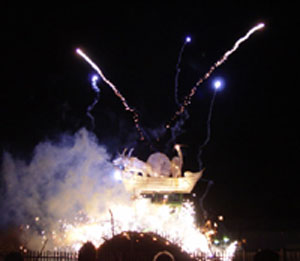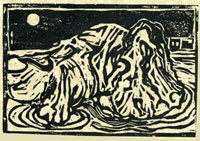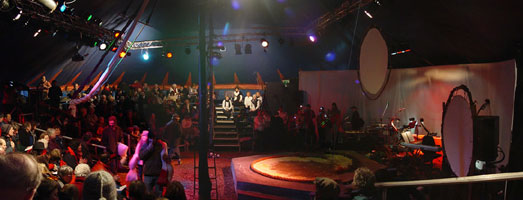As Fox embarks on his work as a solo artist, he takes a longer view of celebratory and community arts, where he sees a split developing.
"At one end of the spectrum there seems to be surrogate social work, which is what community art got turned into by New Labour and the Treasury. At the other end is the celebrity look-at-me stuff, which is what so much of our consumer culture is driven by." In the middle, he sees more and more of what has been termed applied vernacular art. "I don’t like the phrase, but it’s to do with how you build your house, how you mark key moments in your life – funerals, weddings, namings, leaving home, getting a new job, and so on. It’s to do with a whole way of living."
Gardening the Future

Longline: The Carnival Opera
|
It's this middle way, whereby art adds significance to everyday life, that appeals to him. Fox is turning to his garden. He aims to link Japanese Zen gardens with his long-term interest in the Arts and Crafts movement. He acknowledges the influence of film-maker and artist Derek Jarman, who created a garden at his home near Dungeness, on the shingle bank of the Kent coast.
Fox wants to create a garden at his beach house at Bardsea on Morecambe Bay, to discover what plants will grow on that shoreline of sand, shingle and cobble. The garden, provisionally named 'The Weather Station', will also be a place for outdoor gatherings, with a fireplace and bread oven. He hopes this will inspire like-minded people to follow his example, leading to "garden patchworks across the country, which can then be connected in some sort of map of pilgrimage."
He would also like to return to Japan, where in 1982 he produced The Wasteland and the Wagtail, a play on the themes of King Lear staged on a ski slope in Togamura, and to re-engage with the work of one of his deepest influences, the woodblock printmaker Shiko Munakata (1903–1975) whose work he first saw at that time.
"There were pilgrimages that monks and people would make, going from monastery to monastery, with their necklace of sticks. You would make a rubbing when you got there from a stone the monks had carved. And you would take away this offering, or this blessing, or this icon, as part of your journey."

John Fox: One Rock woodcut
|
”What I’m going for at the moment is a link between the gardens, which is to do with cutting the brambles and learning about plants, and then the printing of images, which are part of the ecological diary I am keeping in the manner of Thoreau." He would also like do some performance. "Maybe a performance inspired by the woodcuts with a lecture or poetry that’s written as part of it, and probably with music." In an ideal world there would be singing too. "Because it’s the visceral experience of learning it, doing it and performing it which short-circuits the intellectual head stuff."
As he considers the next phase of life, Fox believes he has become clearer about how much energy and how much time he has got. "I’m sixty-eight. I’m already twice the life expectancy of half the people in the Congo, which is hugely lucky. How much more time have I got before all my bits completely fall off, or I become utterly senile, or stupid? It’s a finite amount of time. Whether it's ten, twenty or thirty years, it doesn’t really matter. It’s less than the time Welfare State was on the planet. It’s enormously salutary. You carry wider responsibilities in terms of grandchildren, which I think has made me even more radical."

Longline: The Carnival Opera
|
John Fox in conversation with David Haley
Photograph of John Fox: Lynda Hebbert
Photographs of Longline: Ben Cornwell
John Fox received the Award for Lifetime’s Contribution to the Arts by the Arts Council England in 2005.
Publications by John Fox and about Welfare State International:
John Fox (2002) Eyes on Stalks. London: Methuen Drama.
Sue Gill and John Fox (1996) The Dead Good Funerals Book (Dead Good Guides). Ulverston: Engineers of the Imagination.
Tony Coult and Baz Kershaw (eds) (1983, revised 1990). Engineers of the Imagination: Welfare State Handbook. London: Methuen Drama.
Welfare State International’s works include:
2005 – Barebones
2003 – One Rock
1999 – 100 Days
1990 – Glasgow All Lit Up, Lantern Festival for Glasgow City of Culture
1988 – Art in the Rites of Death and Bereavement, Devon
1983 – 1990 WSI’s residency in Barrow-in-Furness, Cumbria
1983 – first Ulverston Lantern Procession
1983 – ‘The Raising of the Titanic’, London International Festival of Theatre
1982 – The Wasteland and the Wagtail, Japanese International Festival of Theatre
1976 – Parliament in Flames
1969 – Earthrise: Cosmic Circus
The Welfare State Archive will be housed within the Theatre Collection at Bristol University. www.bris.ac.uk/theatrecollection/welfarestate.html
published 2008
"Applied vernacular art ... it’s to do with how you build your house, how you mark key moments in your life – funerals, weddings, namings, leaving home." "I’m sixty-eight. I’m already twice the life expectancy of half the people in the Congo, which is hugely
lucky." "How much more time have I got before all my bits completely fall off, or I become utterly senile, or stupid? It’s a finite amount of time. Whether it's ten, twenty or thirty years, it doesn’t really matter. It’s less than the time Welfare State was on the planet. It’s enormously salutary." "You carry wider responsibilities in terms of grandchildren, which I think has made me even more radical."
|